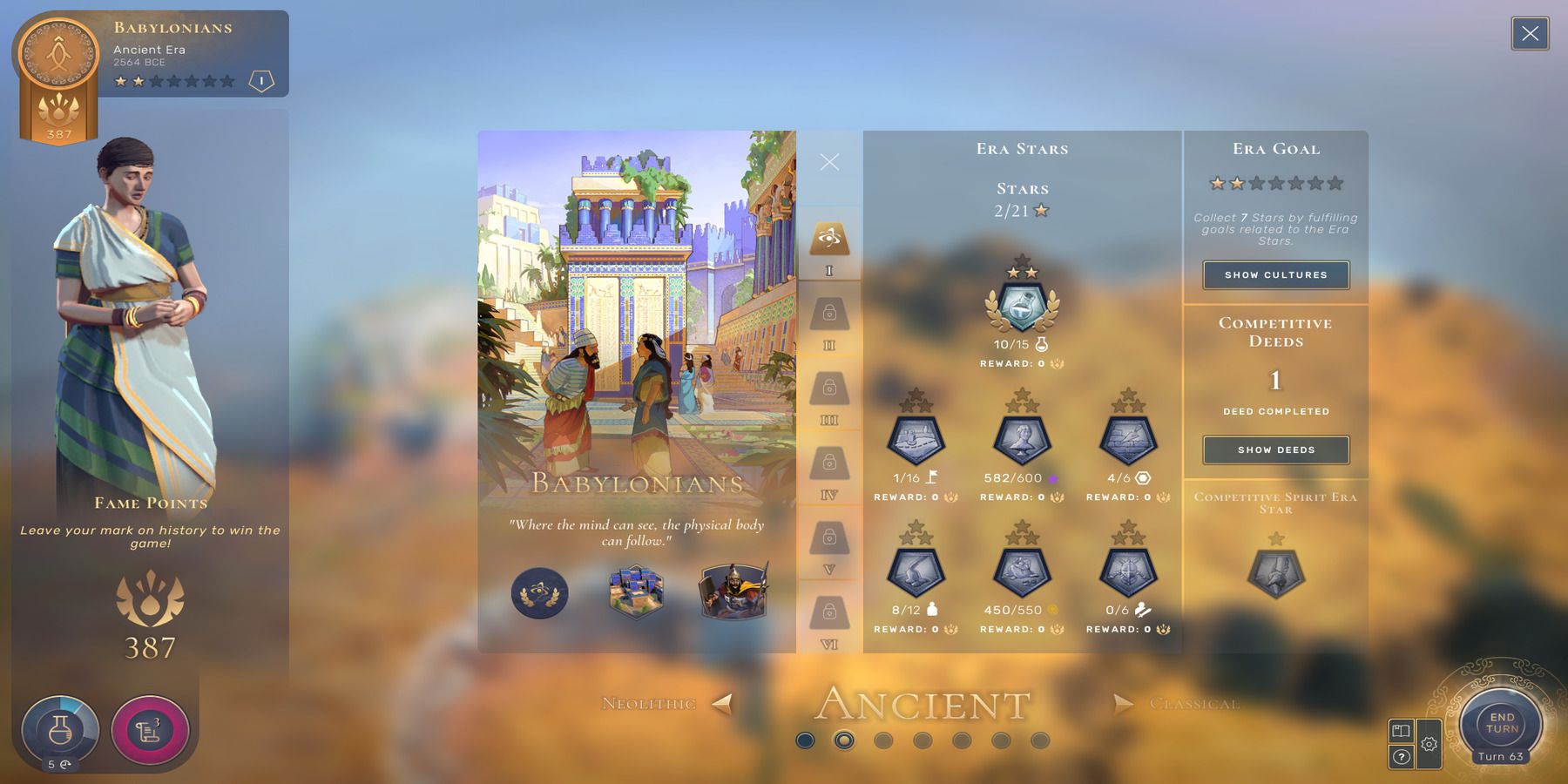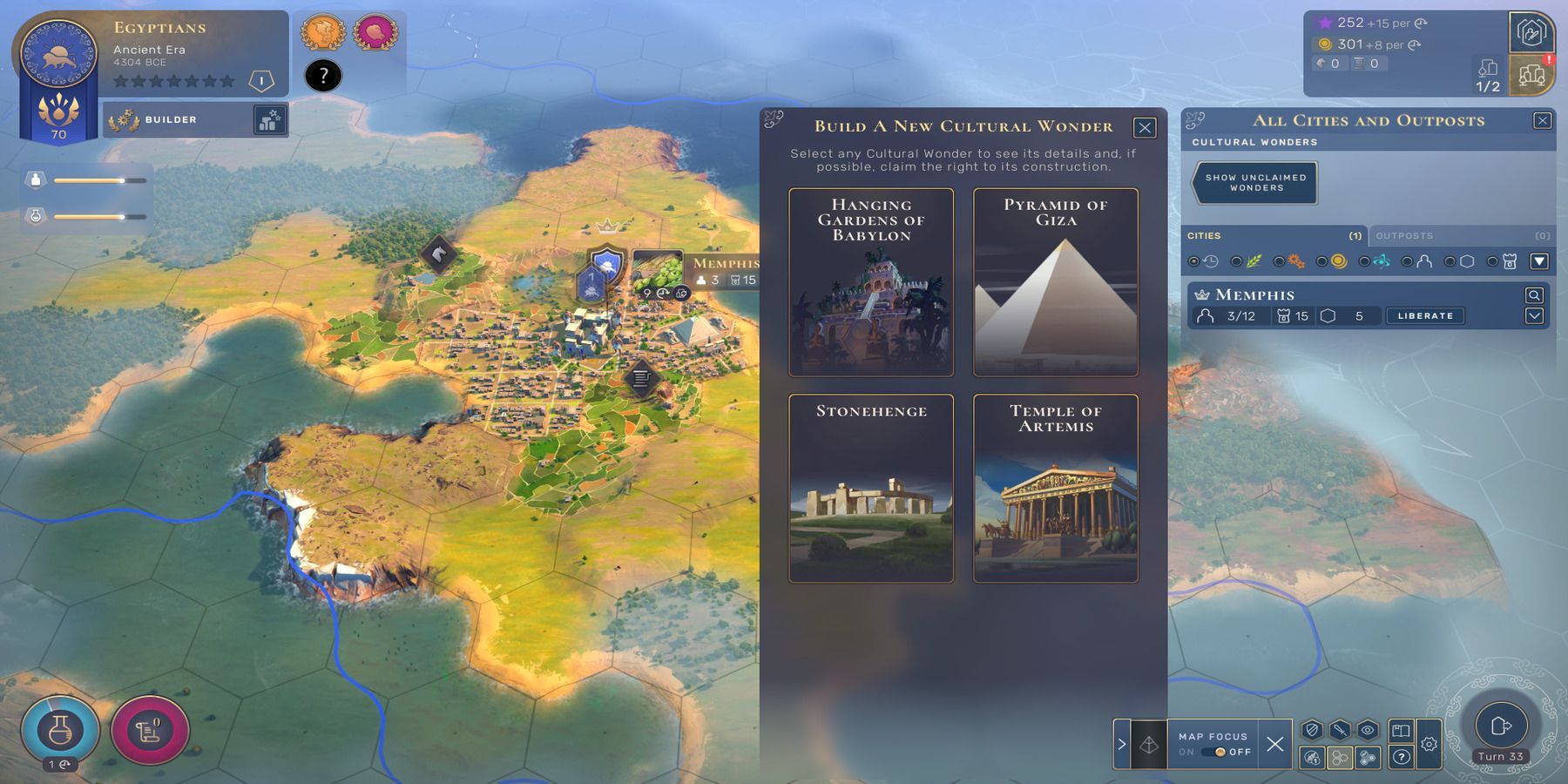Humankind is a recently released turn-based strategy game developed by Amplitude Studios. The game has many similarities to the Civilization series and has been well-received by fans and critics. The 4X strategy game launched on day one of Microsoft's Game Pass service, giving millions of players the chance to try the game at no extra cost.
Humankind doesn't try to hide its Civilization influences and has a range of gameplay mechanics that are virtually identical to the iconic strategy series. However, Amplitude Studios found a way to differentiate Humankind's main structure and end game from Civilization with its innovative Fame mechanic.
What Is Fame?
Fame is by far the most important resource in Humankind. At the end of any campaign, the player who has the most accumulated Fame will be named the winner. It's important to know that this is the case no matter how the end of the game is reached.
So, even if another civilization completes the technology tree or performs the Mars mission, it will still be the civilization with the most Fame that wins. Moreover, a team can be wiped out and eliminated from the game but still win if they earned the most Fame once the game finishes. This is a smart way of preventing the sudden nuclear wars that tend to cap off Civilization games when all bets are off, and loyalties are out of the window, which can sometimes make everything up until that point feel redundant.
How Do You Earn Fame?
Fame is earned through the following sources:
Competitive Deeds
As the name suggests, Competitive Deeds are a selection of objectives that each Empire competes for. There are 23 Competetive Deeds available in Humankind, with a range of objectives like building a wonder, discovering writing, owning a nuclear weapon, and discovering 100% of the world. These deeds offer between 50 and 150 Fame each and are only awarded to the first Empire that completes their objective.
Era Stars
Era Stars are the main source of Fame in Humankind. Each of the game's seven Eras has three Era Stars for each of the game's seven Affinity Traits: Aesthete, Agrarian, Builder, Expansionist, Merchant, Militarist, and Scientist. The amount of Fame earned for completing an Era Star varies, as it is constantly ticking down per turn to encourage players to work efficiently. Furthermore, players will earn double the Fame for whichever Affinity Trait they are currently adopting.
Wonders
There are two types of Wonder in Humankind that can earn players Fame:
- Cultural Wonders - Unique projects that can only be built by one Empire and generate 100 Fame. Cultural Wonders usually take a long time to be built, but they are Shared Projects, so multiple Cities can work on them at once. Cultural Wonders in Humankind include Stonehenge and the Hanging Gardens of Babylon.
- Natural Wonders - Randomly generated on maps and grant the first Empire to discover them 50 Fame. Natural Wonders in Humankind include the Great Barrier Reef and Mount Everest.
Events
Events occur throughout Humankind and require players to make key decisions for the good of their Empire. There are some Events that offer the player a small, one-time amount of Fame based on their decision.
Tips For Earning Fame
Focus On Era Stars, But Don't Get Tunnel Vision
As mentioned before, Era Stars are the main source of Fame in Humankind. Consequently, many new players will get tunnel vision and simply focus on trying to obtain Era Stars as soon as possible. This strategy will help players succeed in the first few Eras, but it will soon come back to haunt them.
By only focusing on Era Stars, players won't build a well-rounded Empire. This poor Empire growth will start to seriously harm the player's progression in the mid-game and will quickly see them fall down the Fame ranks, as their Empire simply won't be able to generate new buildings, train new units and learn new technologies as fast as the other civilizations. Instead of simply focusing on Era Stars, players should focus on building a strong, well-balanced Empire, and the Era Stars will naturally come.
Don't Rely On Competetive Deeds
When players start a new Humankind campaign and see the wealth of available Competitive Deeds, they may be tempted to prioritize them over other Fame methods and start rushing to obtain them. However, this will often prove to be a significant mistake.
Players should always assume that another civilization is aiming to get the same Competetive Deed as they are; otherwise, players will keep finding themselves in the situation where they focus all of their attention on a particular Deed, only for it to be snatched away from them at the last minute. Getting tunnel vision for Competitive Deeds can prove to be even more costly than getting tunnel vision for Era Stars, as continuously trying and failing to get Deeds will result in an underdeveloped Empire with no Fame to show for it.
Share The Map Discovery Deeds
There are a small handful of Competitive Deeds in Humankind, such as the Ptolemt Deed, that reward players for completing sections or all of the world map. These map discovery Deeds can be earned by two civilizations at once as, through diplomacy, the Empires can trade map information with each other, giving them both a combined map - if this trade of map information sees both Empires complete a Competitive Deed simultaneously, they will both earn the Fame points.
By working out what sections of the map each Empire is likely to have discovered and by having a good relationship with them, players should be able to achieve these Deeds in almost every campaign - earning them a good chunk of Fame for only doing part of the work.











